:max_bytes(150000):strip_icc()/plaunk65-3ef6a0a6ceac48b88d3960884b581477.jpg)
"2024 Approved A Compreenas Guide to Choosing Ideal Lenses for Filmmaking"

A Compreenas Guide to Choosing Ideal Lenses for Filmmaking
A Vlogger’s Guide To Camera Lenses

Richard Bennett
Nov 01, 2022• Proven solutions
The staple of any vlog is the talking headshot, a shot of the speaker talking directly to the audience. You can compose this shot with different kinds of lenses for your interchangeable lens camera.
But which kind of lens is the right lens for you as a vlogger?
In this article, I’m going to help you figure that out.
- Part 1: Three Focal Length Groups: Wide, Standard, Telephoto
- Part 2: Vlogging With Each Focal Length Group
- Part 3: Crop Factor
- Part 4: Focal Length Equivalency Table
- Part 5: Aperture
- Part 6: Vlogging With a Fast Lens
- Part 7: Optical Image Stabilization
Three Focal Length Groups: Wide, Standard, Telephoto
There are three main ranges in focal lengths that camera lenses can be categorized into wide, standard, and telephoto.
Wide-Angle Lens
Wide-angle lenses can “see more.” They allow more of your scene to fit inside your frame. Objects that are closer to the lens appear much bigger while objects that are further away appear even smaller. Perspectives are also enhanced, making close objects and people that just make it into the sides of the frame appear more stretched out. Out of all the other ranges in focal lengths, wide-angle lenses will appear the least zoomed in.
Standard Lens
With standard lenses or normal lenses, you won’t get the stretched out objects or enhanced perspectives that you get from wide-angle lenses. Instead, standard lenses are meant to see scenes as the natural human eye is meant to see them. If you shoot a scene with both a wide-angle lens and a standard lens from the same position, you’ll notice that less of the scene fits into your frame. Standard lenses will appear more zoomed-in than wide-angle lenses, but less zoomed-in than telephoto lenses.
Telephoto Lens
Out of all the other ranges in focal lengths, telephoto lenses will appear the most zoomed in. This can be beneficial for the shooter who wants to get a closer shot of a scene without having to physically be in close proximity to the scene. Objects that are further away in the background also appear larger and closer than they would appear on wide-angle or standard lenses.
Vlogging With Each Focal Length Group
You can get your talking head footage using lenses from any of the three focal length groups. Depending on how you plan to vlog most of the time, though, one of the three focal lengths might be more suitable for you.
When to vlog with a wide-angle lens
Wide-angle lenses are the most commonly used lenses for vlogging. Wide-angle lenses are great when you need to be close to your camera. This might be the case for you if your recording space is small or if you want to film yourself as you hold your camera up with your own hand.
Being close to your camera not only gives you the option to use your camera’s built-in microphone, but it also gives you the option to make use of camera-mounted shotgun microphones.
When to vlog with a standard lens
Standard lenses are great when you have more space to be further away from your camera. The perspectives in your shot will look more natural through a standard lens, making your talking head footage feel more corporate or professional. You’ll also be able to get blurrier backgrounds using a standard lens versus a wide-angle lens.
Being further away from your camera, however, means that you’ll have to use a separate microphone positioned closer to you.
When to vlog with a telephoto lens
As telephoto lenses are even more zoomed in, you’ll need to be even further away from your camera to fit yourself inside your camera frame. Why would any vlogger ever need to be that far away from their camera? One word… teleprompter. If you want or need to stick to a script, you’ll have to be far away enough from your camera that it doesn’t appear like your eyes are scanning left to right. You then close in the distance with a telephoto lens.
In the above video, Marcos Rocha compares different focal lengths for talking head videos. Which focal length range do you like the look of?
Crop Factor
Focal lengths in camera lenses are measured in millimeters. You can vlog yourself handheld with a 24mm lens on a camera with a full-frame sensor (the sensor is the piece of hardware inside your camera that turns the light it receives into a digital image). But if you use a 24mm lens on a camera with a smaller sensor, like an APS-C sensor or even smaller Micro 4/3 sensor, more of you will get cropped out (see below).
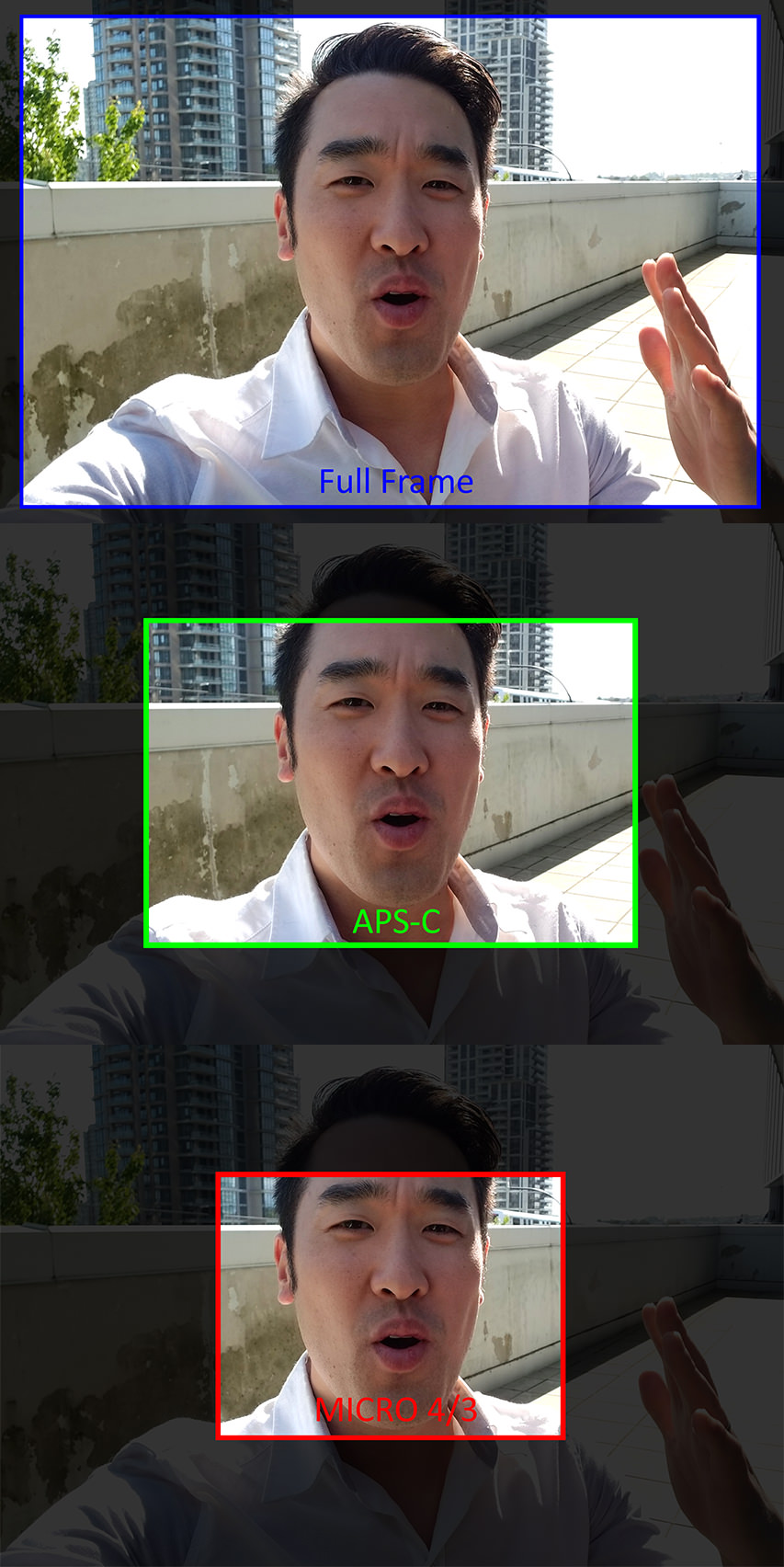
In order to make up for the cropping that occurs, you will need to use a wider lens on cameras with smaller sensors to get the same shot you’d get with a full-frame camera.
Focal Length Equivalency Table
This table shows you the focal lengths needed to achieve the same shot between cameras with different sensor sizes. In order to take a shot as wide as the shot I took of myself with the 24mm lens on my full-frame camera, I would need a 15mm lens on an APS-C sensor camera or a 12mm lens on a micro 4/3 camera.
| Focal Length / Sensor | Full Frame | APS-C | Micro 4/3 |
|---|---|---|---|
| Wide (Handheld Selfie-Safe) | 16mm | 10mm | 8mm |
| Wide (Handheld Selfie-Safe) | 18mm | 11mm | 9mm |
| Wide (Handheld Selfie-Safe) | 24mm | 15mm | 12mm |
| Wide | 35mm | 22mm | 18mm |
| Standard | 50mm | 31mm | 25mm |
| Telephoto | 70mm | 44mm | 35mm |
| Telephoto | 100mm | 63mm | 50mm |
| Telephoto | 200mm | 125mm | 100mm |
Aperture
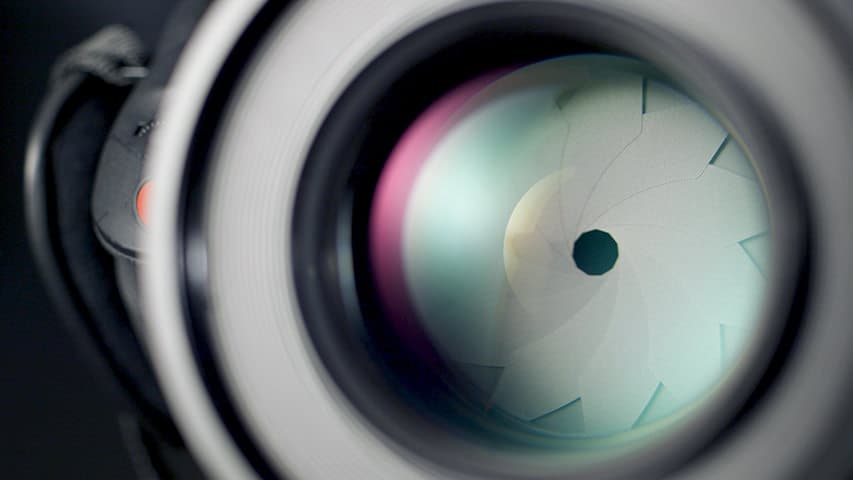
The next thing to consider when you’re looking for a lens is the aperture, the hole (often adjustable) within the lens that lets light in. Aperture for camera lenses is measured in f-stops (f/1.4, f/1.8, f/2.0) - the smaller the f-stop number, the larger the aperture (bigger hole letting even more light in).

Because larger aperture lenses let more light in, they need a shorter time for cameras to compose an image. This is why larger aperture lenses are also called “fast” lenses.
Fast lenses are more expensive because they cost more to produce. There’s a lot more that goes into them, including larger and higher quality glass elements.
But do you even need a fast lens?
Vlogging With a Fast Lens
Pros of Vlogging With a Fast Lens
- Better low-light performance
- Better autofocus performance
- Better “bokeh” (out-of-focus areas, like your background, having that nice blurry look that you see in a lot of movies)
Cons of Vlogging With a Fast Lens
- More expensive
- Moving subjects more likely to get out of focus when shooting with a large aperture
- Better continuous autofocus performance needed when shooting moving subjects with a large aperture
Optical Image Stabilization
Finally, you’ll have to decide whether or not you want your lens to have built-in optical image stabilization (OIS).
OIS is very beneficial to have on a lens if you’re a vlogger who films mostly handheld footage. Although this technology adds to the price of your lens as well, it can greatly help you to capture smoother footage that may otherwise be shaky. Nikon calls this technology “Vibration Reduction” (VR) for their lenses.
In the above video, you can see how much OIS can help to stabilize your footage. MicBergsma simultaneously compares the footage between two GoPro Hero5 Blacks, one with OIS on and one with OIS off.
If, however, you are shooting most of your vlogs on a tripod, you won’t need a lens with OIS.
Looking for ways to set up your talking-head shot for YouTube with any of these lenses? Check out our post on 4 Ways To Set Up Your Talking-Head Shots For YouTube .

Richard Bennett
Richard Bennett is a writer and a lover of all things video.
Follow @Richard Bennett
Richard Bennett
Nov 01, 2022• Proven solutions
The staple of any vlog is the talking headshot, a shot of the speaker talking directly to the audience. You can compose this shot with different kinds of lenses for your interchangeable lens camera.
But which kind of lens is the right lens for you as a vlogger?
In this article, I’m going to help you figure that out.
- Part 1: Three Focal Length Groups: Wide, Standard, Telephoto
- Part 2: Vlogging With Each Focal Length Group
- Part 3: Crop Factor
- Part 4: Focal Length Equivalency Table
- Part 5: Aperture
- Part 6: Vlogging With a Fast Lens
- Part 7: Optical Image Stabilization
Three Focal Length Groups: Wide, Standard, Telephoto
There are three main ranges in focal lengths that camera lenses can be categorized into wide, standard, and telephoto.
Wide-Angle Lens
Wide-angle lenses can “see more.” They allow more of your scene to fit inside your frame. Objects that are closer to the lens appear much bigger while objects that are further away appear even smaller. Perspectives are also enhanced, making close objects and people that just make it into the sides of the frame appear more stretched out. Out of all the other ranges in focal lengths, wide-angle lenses will appear the least zoomed in.
Standard Lens
With standard lenses or normal lenses, you won’t get the stretched out objects or enhanced perspectives that you get from wide-angle lenses. Instead, standard lenses are meant to see scenes as the natural human eye is meant to see them. If you shoot a scene with both a wide-angle lens and a standard lens from the same position, you’ll notice that less of the scene fits into your frame. Standard lenses will appear more zoomed-in than wide-angle lenses, but less zoomed-in than telephoto lenses.
Telephoto Lens
Out of all the other ranges in focal lengths, telephoto lenses will appear the most zoomed in. This can be beneficial for the shooter who wants to get a closer shot of a scene without having to physically be in close proximity to the scene. Objects that are further away in the background also appear larger and closer than they would appear on wide-angle or standard lenses.
Vlogging With Each Focal Length Group
You can get your talking head footage using lenses from any of the three focal length groups. Depending on how you plan to vlog most of the time, though, one of the three focal lengths might be more suitable for you.
When to vlog with a wide-angle lens
Wide-angle lenses are the most commonly used lenses for vlogging. Wide-angle lenses are great when you need to be close to your camera. This might be the case for you if your recording space is small or if you want to film yourself as you hold your camera up with your own hand.
Being close to your camera not only gives you the option to use your camera’s built-in microphone, but it also gives you the option to make use of camera-mounted shotgun microphones.
When to vlog with a standard lens
Standard lenses are great when you have more space to be further away from your camera. The perspectives in your shot will look more natural through a standard lens, making your talking head footage feel more corporate or professional. You’ll also be able to get blurrier backgrounds using a standard lens versus a wide-angle lens.
Being further away from your camera, however, means that you’ll have to use a separate microphone positioned closer to you.
When to vlog with a telephoto lens
As telephoto lenses are even more zoomed in, you’ll need to be even further away from your camera to fit yourself inside your camera frame. Why would any vlogger ever need to be that far away from their camera? One word… teleprompter. If you want or need to stick to a script, you’ll have to be far away enough from your camera that it doesn’t appear like your eyes are scanning left to right. You then close in the distance with a telephoto lens.
In the above video, Marcos Rocha compares different focal lengths for talking head videos. Which focal length range do you like the look of?
Crop Factor
Focal lengths in camera lenses are measured in millimeters. You can vlog yourself handheld with a 24mm lens on a camera with a full-frame sensor (the sensor is the piece of hardware inside your camera that turns the light it receives into a digital image). But if you use a 24mm lens on a camera with a smaller sensor, like an APS-C sensor or even smaller Micro 4/3 sensor, more of you will get cropped out (see below).

In order to make up for the cropping that occurs, you will need to use a wider lens on cameras with smaller sensors to get the same shot you’d get with a full-frame camera.
Focal Length Equivalency Table
This table shows you the focal lengths needed to achieve the same shot between cameras with different sensor sizes. In order to take a shot as wide as the shot I took of myself with the 24mm lens on my full-frame camera, I would need a 15mm lens on an APS-C sensor camera or a 12mm lens on a micro 4/3 camera.
| Focal Length / Sensor | Full Frame | APS-C | Micro 4/3 |
|---|---|---|---|
| Wide (Handheld Selfie-Safe) | 16mm | 10mm | 8mm |
| Wide (Handheld Selfie-Safe) | 18mm | 11mm | 9mm |
| Wide (Handheld Selfie-Safe) | 24mm | 15mm | 12mm |
| Wide | 35mm | 22mm | 18mm |
| Standard | 50mm | 31mm | 25mm |
| Telephoto | 70mm | 44mm | 35mm |
| Telephoto | 100mm | 63mm | 50mm |
| Telephoto | 200mm | 125mm | 100mm |
Aperture

The next thing to consider when you’re looking for a lens is the aperture, the hole (often adjustable) within the lens that lets light in. Aperture for camera lenses is measured in f-stops (f/1.4, f/1.8, f/2.0) - the smaller the f-stop number, the larger the aperture (bigger hole letting even more light in).

Because larger aperture lenses let more light in, they need a shorter time for cameras to compose an image. This is why larger aperture lenses are also called “fast” lenses.
Fast lenses are more expensive because they cost more to produce. There’s a lot more that goes into them, including larger and higher quality glass elements.
But do you even need a fast lens?
Vlogging With a Fast Lens
Pros of Vlogging With a Fast Lens
- Better low-light performance
- Better autofocus performance
- Better “bokeh” (out-of-focus areas, like your background, having that nice blurry look that you see in a lot of movies)
Cons of Vlogging With a Fast Lens
- More expensive
- Moving subjects more likely to get out of focus when shooting with a large aperture
- Better continuous autofocus performance needed when shooting moving subjects with a large aperture
Optical Image Stabilization
Finally, you’ll have to decide whether or not you want your lens to have built-in optical image stabilization (OIS).
OIS is very beneficial to have on a lens if you’re a vlogger who films mostly handheld footage. Although this technology adds to the price of your lens as well, it can greatly help you to capture smoother footage that may otherwise be shaky. Nikon calls this technology “Vibration Reduction” (VR) for their lenses.
In the above video, you can see how much OIS can help to stabilize your footage. MicBergsma simultaneously compares the footage between two GoPro Hero5 Blacks, one with OIS on and one with OIS off.
If, however, you are shooting most of your vlogs on a tripod, you won’t need a lens with OIS.
Looking for ways to set up your talking-head shot for YouTube with any of these lenses? Check out our post on 4 Ways To Set Up Your Talking-Head Shots For YouTube .

Richard Bennett
Richard Bennett is a writer and a lover of all things video.
Follow @Richard Bennett
Richard Bennett
Nov 01, 2022• Proven solutions
The staple of any vlog is the talking headshot, a shot of the speaker talking directly to the audience. You can compose this shot with different kinds of lenses for your interchangeable lens camera.
But which kind of lens is the right lens for you as a vlogger?
In this article, I’m going to help you figure that out.
- Part 1: Three Focal Length Groups: Wide, Standard, Telephoto
- Part 2: Vlogging With Each Focal Length Group
- Part 3: Crop Factor
- Part 4: Focal Length Equivalency Table
- Part 5: Aperture
- Part 6: Vlogging With a Fast Lens
- Part 7: Optical Image Stabilization
Three Focal Length Groups: Wide, Standard, Telephoto
There are three main ranges in focal lengths that camera lenses can be categorized into wide, standard, and telephoto.
Wide-Angle Lens
Wide-angle lenses can “see more.” They allow more of your scene to fit inside your frame. Objects that are closer to the lens appear much bigger while objects that are further away appear even smaller. Perspectives are also enhanced, making close objects and people that just make it into the sides of the frame appear more stretched out. Out of all the other ranges in focal lengths, wide-angle lenses will appear the least zoomed in.
Standard Lens
With standard lenses or normal lenses, you won’t get the stretched out objects or enhanced perspectives that you get from wide-angle lenses. Instead, standard lenses are meant to see scenes as the natural human eye is meant to see them. If you shoot a scene with both a wide-angle lens and a standard lens from the same position, you’ll notice that less of the scene fits into your frame. Standard lenses will appear more zoomed-in than wide-angle lenses, but less zoomed-in than telephoto lenses.
Telephoto Lens
Out of all the other ranges in focal lengths, telephoto lenses will appear the most zoomed in. This can be beneficial for the shooter who wants to get a closer shot of a scene without having to physically be in close proximity to the scene. Objects that are further away in the background also appear larger and closer than they would appear on wide-angle or standard lenses.
 Allavsoft Batch Download Online Videos, Music Offline to MP4, MP3, MOV, etc format
Allavsoft Batch Download Online Videos, Music Offline to MP4, MP3, MOV, etc format
Vlogging With Each Focal Length Group
You can get your talking head footage using lenses from any of the three focal length groups. Depending on how you plan to vlog most of the time, though, one of the three focal lengths might be more suitable for you.
When to vlog with a wide-angle lens
Wide-angle lenses are the most commonly used lenses for vlogging. Wide-angle lenses are great when you need to be close to your camera. This might be the case for you if your recording space is small or if you want to film yourself as you hold your camera up with your own hand.
Being close to your camera not only gives you the option to use your camera’s built-in microphone, but it also gives you the option to make use of camera-mounted shotgun microphones.
When to vlog with a standard lens
Standard lenses are great when you have more space to be further away from your camera. The perspectives in your shot will look more natural through a standard lens, making your talking head footage feel more corporate or professional. You’ll also be able to get blurrier backgrounds using a standard lens versus a wide-angle lens.
Being further away from your camera, however, means that you’ll have to use a separate microphone positioned closer to you.
When to vlog with a telephoto lens
As telephoto lenses are even more zoomed in, you’ll need to be even further away from your camera to fit yourself inside your camera frame. Why would any vlogger ever need to be that far away from their camera? One word… teleprompter. If you want or need to stick to a script, you’ll have to be far away enough from your camera that it doesn’t appear like your eyes are scanning left to right. You then close in the distance with a telephoto lens.
In the above video, Marcos Rocha compares different focal lengths for talking head videos. Which focal length range do you like the look of?
Crop Factor
Focal lengths in camera lenses are measured in millimeters. You can vlog yourself handheld with a 24mm lens on a camera with a full-frame sensor (the sensor is the piece of hardware inside your camera that turns the light it receives into a digital image). But if you use a 24mm lens on a camera with a smaller sensor, like an APS-C sensor or even smaller Micro 4/3 sensor, more of you will get cropped out (see below).

In order to make up for the cropping that occurs, you will need to use a wider lens on cameras with smaller sensors to get the same shot you’d get with a full-frame camera.
Focal Length Equivalency Table
This table shows you the focal lengths needed to achieve the same shot between cameras with different sensor sizes. In order to take a shot as wide as the shot I took of myself with the 24mm lens on my full-frame camera, I would need a 15mm lens on an APS-C sensor camera or a 12mm lens on a micro 4/3 camera.
| Focal Length / Sensor | Full Frame | APS-C | Micro 4/3 |
|---|---|---|---|
| Wide (Handheld Selfie-Safe) | 16mm | 10mm | 8mm |
| Wide (Handheld Selfie-Safe) | 18mm | 11mm | 9mm |
| Wide (Handheld Selfie-Safe) | 24mm | 15mm | 12mm |
| Wide | 35mm | 22mm | 18mm |
| Standard | 50mm | 31mm | 25mm |
| Telephoto | 70mm | 44mm | 35mm |
| Telephoto | 100mm | 63mm | 50mm |
| Telephoto | 200mm | 125mm | 100mm |
Aperture

The next thing to consider when you’re looking for a lens is the aperture, the hole (often adjustable) within the lens that lets light in. Aperture for camera lenses is measured in f-stops (f/1.4, f/1.8, f/2.0) - the smaller the f-stop number, the larger the aperture (bigger hole letting even more light in).
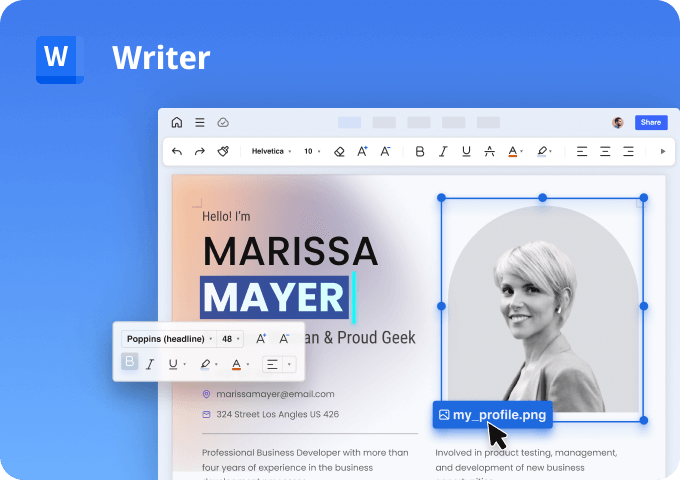
WPS Office Premium ( File Recovery, Photo Scanning, Convert PDF)–Yearly

Because larger aperture lenses let more light in, they need a shorter time for cameras to compose an image. This is why larger aperture lenses are also called “fast” lenses.
Fast lenses are more expensive because they cost more to produce. There’s a lot more that goes into them, including larger and higher quality glass elements.
But do you even need a fast lens?
Vlogging With a Fast Lens
Pros of Vlogging With a Fast Lens
- Better low-light performance
- Better autofocus performance
- Better “bokeh” (out-of-focus areas, like your background, having that nice blurry look that you see in a lot of movies)
Cons of Vlogging With a Fast Lens
- More expensive
- Moving subjects more likely to get out of focus when shooting with a large aperture
- Better continuous autofocus performance needed when shooting moving subjects with a large aperture
Optical Image Stabilization
Finally, you’ll have to decide whether or not you want your lens to have built-in optical image stabilization (OIS).
OIS is very beneficial to have on a lens if you’re a vlogger who films mostly handheld footage. Although this technology adds to the price of your lens as well, it can greatly help you to capture smoother footage that may otherwise be shaky. Nikon calls this technology “Vibration Reduction” (VR) for their lenses.
In the above video, you can see how much OIS can help to stabilize your footage. MicBergsma simultaneously compares the footage between two GoPro Hero5 Blacks, one with OIS on and one with OIS off.
If, however, you are shooting most of your vlogs on a tripod, you won’t need a lens with OIS.
Looking for ways to set up your talking-head shot for YouTube with any of these lenses? Check out our post on 4 Ways To Set Up Your Talking-Head Shots For YouTube .

Richard Bennett
Richard Bennett is a writer and a lover of all things video.
Follow @Richard Bennett
Richard Bennett
Nov 01, 2022• Proven solutions
The staple of any vlog is the talking headshot, a shot of the speaker talking directly to the audience. You can compose this shot with different kinds of lenses for your interchangeable lens camera.
But which kind of lens is the right lens for you as a vlogger?
In this article, I’m going to help you figure that out.
- Part 1: Three Focal Length Groups: Wide, Standard, Telephoto
- Part 2: Vlogging With Each Focal Length Group
- Part 3: Crop Factor
- Part 4: Focal Length Equivalency Table
- Part 5: Aperture
- Part 6: Vlogging With a Fast Lens
- Part 7: Optical Image Stabilization
Three Focal Length Groups: Wide, Standard, Telephoto
There are three main ranges in focal lengths that camera lenses can be categorized into wide, standard, and telephoto.
Wide-Angle Lens
Wide-angle lenses can “see more.” They allow more of your scene to fit inside your frame. Objects that are closer to the lens appear much bigger while objects that are further away appear even smaller. Perspectives are also enhanced, making close objects and people that just make it into the sides of the frame appear more stretched out. Out of all the other ranges in focal lengths, wide-angle lenses will appear the least zoomed in.
Standard Lens
With standard lenses or normal lenses, you won’t get the stretched out objects or enhanced perspectives that you get from wide-angle lenses. Instead, standard lenses are meant to see scenes as the natural human eye is meant to see them. If you shoot a scene with both a wide-angle lens and a standard lens from the same position, you’ll notice that less of the scene fits into your frame. Standard lenses will appear more zoomed-in than wide-angle lenses, but less zoomed-in than telephoto lenses.
Telephoto Lens
Out of all the other ranges in focal lengths, telephoto lenses will appear the most zoomed in. This can be beneficial for the shooter who wants to get a closer shot of a scene without having to physically be in close proximity to the scene. Objects that are further away in the background also appear larger and closer than they would appear on wide-angle or standard lenses.
Vlogging With Each Focal Length Group
You can get your talking head footage using lenses from any of the three focal length groups. Depending on how you plan to vlog most of the time, though, one of the three focal lengths might be more suitable for you.
When to vlog with a wide-angle lens
Wide-angle lenses are the most commonly used lenses for vlogging. Wide-angle lenses are great when you need to be close to your camera. This might be the case for you if your recording space is small or if you want to film yourself as you hold your camera up with your own hand.
Being close to your camera not only gives you the option to use your camera’s built-in microphone, but it also gives you the option to make use of camera-mounted shotgun microphones.
When to vlog with a standard lens
Standard lenses are great when you have more space to be further away from your camera. The perspectives in your shot will look more natural through a standard lens, making your talking head footage feel more corporate or professional. You’ll also be able to get blurrier backgrounds using a standard lens versus a wide-angle lens.
Being further away from your camera, however, means that you’ll have to use a separate microphone positioned closer to you.
When to vlog with a telephoto lens
As telephoto lenses are even more zoomed in, you’ll need to be even further away from your camera to fit yourself inside your camera frame. Why would any vlogger ever need to be that far away from their camera? One word… teleprompter. If you want or need to stick to a script, you’ll have to be far away enough from your camera that it doesn’t appear like your eyes are scanning left to right. You then close in the distance with a telephoto lens.
In the above video, Marcos Rocha compares different focal lengths for talking head videos. Which focal length range do you like the look of?
Crop Factor
Focal lengths in camera lenses are measured in millimeters. You can vlog yourself handheld with a 24mm lens on a camera with a full-frame sensor (the sensor is the piece of hardware inside your camera that turns the light it receives into a digital image). But if you use a 24mm lens on a camera with a smaller sensor, like an APS-C sensor or even smaller Micro 4/3 sensor, more of you will get cropped out (see below).

In order to make up for the cropping that occurs, you will need to use a wider lens on cameras with smaller sensors to get the same shot you’d get with a full-frame camera.
Focal Length Equivalency Table
This table shows you the focal lengths needed to achieve the same shot between cameras with different sensor sizes. In order to take a shot as wide as the shot I took of myself with the 24mm lens on my full-frame camera, I would need a 15mm lens on an APS-C sensor camera or a 12mm lens on a micro 4/3 camera.
| Focal Length / Sensor | Full Frame | APS-C | Micro 4/3 |
|---|---|---|---|
| Wide (Handheld Selfie-Safe) | 16mm | 10mm | 8mm |
| Wide (Handheld Selfie-Safe) | 18mm | 11mm | 9mm |
| Wide (Handheld Selfie-Safe) | 24mm | 15mm | 12mm |
| Wide | 35mm | 22mm | 18mm |
| Standard | 50mm | 31mm | 25mm |
| Telephoto | 70mm | 44mm | 35mm |
| Telephoto | 100mm | 63mm | 50mm |
| Telephoto | 200mm | 125mm | 100mm |
Aperture

The next thing to consider when you’re looking for a lens is the aperture, the hole (often adjustable) within the lens that lets light in. Aperture for camera lenses is measured in f-stops (f/1.4, f/1.8, f/2.0) - the smaller the f-stop number, the larger the aperture (bigger hole letting even more light in).

Because larger aperture lenses let more light in, they need a shorter time for cameras to compose an image. This is why larger aperture lenses are also called “fast” lenses.
Fast lenses are more expensive because they cost more to produce. There’s a lot more that goes into them, including larger and higher quality glass elements.
But do you even need a fast lens?
Vlogging With a Fast Lens
Pros of Vlogging With a Fast Lens
- Better low-light performance
- Better autofocus performance
- Better “bokeh” (out-of-focus areas, like your background, having that nice blurry look that you see in a lot of movies)
Cons of Vlogging With a Fast Lens
- More expensive
- Moving subjects more likely to get out of focus when shooting with a large aperture
- Better continuous autofocus performance needed when shooting moving subjects with a large aperture
Optical Image Stabilization
Finally, you’ll have to decide whether or not you want your lens to have built-in optical image stabilization (OIS).
OIS is very beneficial to have on a lens if you’re a vlogger who films mostly handheld footage. Although this technology adds to the price of your lens as well, it can greatly help you to capture smoother footage that may otherwise be shaky. Nikon calls this technology “Vibration Reduction” (VR) for their lenses.
In the above video, you can see how much OIS can help to stabilize your footage. MicBergsma simultaneously compares the footage between two GoPro Hero5 Blacks, one with OIS on and one with OIS off.
If, however, you are shooting most of your vlogs on a tripod, you won’t need a lens with OIS.
Looking for ways to set up your talking-head shot for YouTube with any of these lenses? Check out our post on 4 Ways To Set Up Your Talking-Head Shots For YouTube .

Richard Bennett
Richard Bennett is a writer and a lover of all things video.
Follow @Richard Bennett
Assessing TSeries’ Financial Outcomes From YouTube Presence
Founded by Gulshan Kumar on 11 July 1983, T-Series is an Indian Music record label with over 220 million subscribers on YouTube. Lately, there have been lots of controversies about the T-Series YouTube income, and one common question that we see is “What is T-Series income on YouTube?”
So, if you have the same question, then, you’ve come to the right page to find an answer. In this post, we’ve covered everything you need to know about the T-Series YouTube income. So, without wasting much time, let’s dive in to find out more.
Part 1: Information Box on T Series
Before we reveal all you need to know about T-Series YouTube income, here is an overview of Who T-Series is.
| Name | T-Series |
|---|---|
| Real Name | Bhushan Kumar Dua |
| Net Worth (2022) | $515.4 Million |
| Monthly Income and Salary | Approximately $8.6 Million |
| Yearly Income | Over $128 Million |
| Type | Private |
| Industry | Music & Entertainment |
| Founded | 11 July 1983; 39 years ago in Delhi, India |
| Founder | Gulshan Kumar |
| Key People | Bhushan Kumar Dua (Chairman, managing director), Krishan Kumar, Neeraj Kalyan (President) |
| Services | Music record label % Film production |
| YouTube Channel | T-Series |
| Awards and Recognition | Creator Awards |
Now you have an overview of what T-Series YouTube channel income is, read on to discover more
Part 2: T-Series YouTube Earning and Stats
T-Series main source of revenue is the views and adverts, and as of when this article was written, research shows that T-Series attracts more than 2.15 billion views per month. Since a YouTube channel could earn an average of $3 to $5 per one thousand views, it can be estimated that T-Series earn a monthly income of up to $8.6 Million per month, and could make up to over 128 Million per year. Do you still want to find out more? Check out the table on T-Series stats;
| Estimated Monthly Earning (USD/INDIAN RUPEES) | $8.6 Million / R.S699 Million |
|---|---|
| Estimated Yearly Earning (USD/INDIAN RUPEES) | Approximately $128 Million / R.S 10.4 Billion |
| Total Videos Uploads | 17, 516 |
| Total Views | 202,606,674,113 |
| Subscribers | 225 Million |
| Years Active | 16 years |
| Genre | Music |
T-Series is very popular on all social media platforms, including Facebook, Twitter, and Instagram. He has been in the game for so long that anyone believes in the content he creates. The company was discovered in the 1980s by Gulshan Kumar a cassette tape business, and it was focused on devotional music, especially Hindu hymns and Bollywood music.M
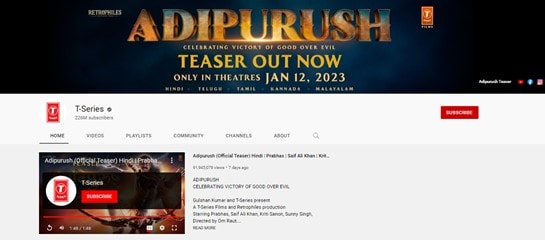
The good thing back then was that T-Series was the first of its kind, and the devotional music market was really big, especially amongst old folks. So, it was easy for T-Series music to reach the right audience within a short time, and it had its first breakthrough in the late 1980s.
Fast forward to 2004, telecommunication companies were having complaints from mobile phone users who were not satisfied with their ringtones. So, T-Series became their plug and started 30-second of their music to them. Then, in 2009, when YouTube was launched in India, T-Series discovered lots of his music where being uploaded on YouTube illegally. This led to a ruling against YouTube, and in January 2011, T-Series published its first video on YouTube.
Since 2011 till now, T-Series has experienced tremendous growth. T-Series has up to 29 different YouTube channels with total subscribers of 225million with over a billion views monthly, making them one of the top-leading YouTube channels globally. Right now,
Part 3: Why Is T-Series Trending on YouTube?
Since you already know what T-Series income on YouTube is, you might be eager to find out what he did that made him so popular and became a trend on YouTube. Well, the truth is, T-Series is not doing anything no one can do. However, he has been in the industry for so long that his YouTube channel is like a dish for many viewers, especially the ones in India.
Below are the three main things why T-Series is always trending on YouTube;
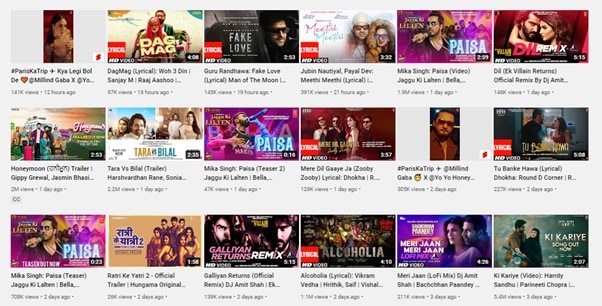
Huge YouTube Channel Monthly Visits
Boasting monthly views of over 100 million per month, T-Series is one of the few YouTube channels that usually have millions of visits from users globally every month. Research shows that the YouTube channel usually has approximately 7.9million visitors per month. This huge monthly visit helps them stay at the top of most YouTube searches that relates with his videos keywords, thus making them trend more when compared with his competitor’s YouTube channel.
Large Subscriber Base
With over 225 million subscribers and still counting, T-Series YouTube channel is a home for many folks to listen to music and see movie thrillers. The large subscriber base plays a huge role in his trend, and the subscriber base continues to increase, he still has the high chance of maintaining his trend within the industry for a very long time.
 Glary Utilities PRO - Premium all-in-one utility to clean, speed up, maintain and protect your PC
Glary Utilities PRO - Premium all-in-one utility to clean, speed up, maintain and protect your PC
Regular Posting of Quality Videos
Having a huge YouTube subscriber base is one thing, but being able to deliver quality video content that anyone would love to watch is different. T-Series has been consistent in delivering quality videos, that immediately he uploads a new video on YouTube, he starts getting massive views instantly. Many folks are always eager to see his next upload on YouTube. This has been the same thing for T-Series over the past years, and it has helped him gained more and more popularity.
## Bonus Tip: How to be a YouTuber and Make Videos like t seriesTo be a YouTube-like T-Series you don’t only need to put in the hard work in what you do, you also need to be smart and stay consistent. Plus, you must acquire advanced video editing software that will help you create videos that will make you stand out in the industry. One such video editing software is Wondershare’s Filmora video editor.
Filmora is a video editing powerhouse that boasts lots of efficient tools that one can use to edit every aspect of a video clip. From removing background noise to editing audio, adding transitions, applying effects, and lots more. The tool is one that any YouTuber must have at his/her fingertips.
Besides, Filmora offers lots of free built-in video effects from popular platforms like FilmStock, Pixel, Unsplash, and many others. The amazing thing is you don’t necessarily need video editing skills to utilize the features of the software.
Here is how to use Filmora to Create Impressive Videos for YouTube;
Free Download For Win 7 or later(64-bit)
Free Download For macOS 10.14 or later
Step1 Download the latest version of Filmora from the official website and install it. Then, launch the tool and use the Import button to upload the YouTube video you wish to edit.
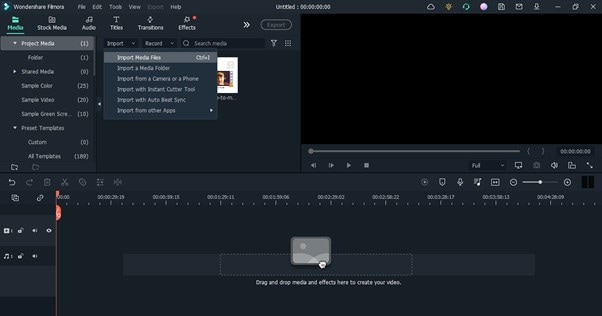
Drag-n-drop the imported video to the Timeline.
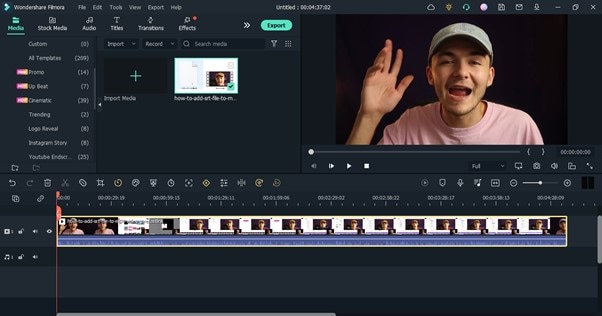
Step2 Navigate to the top of the screen and select Effects. Choose AI Portrait from the left-hand side. After that, drag-n-drop a preferred AI Portrait effect to the Timeline. Then, adjust it to the section of your video you want it to be displayed.
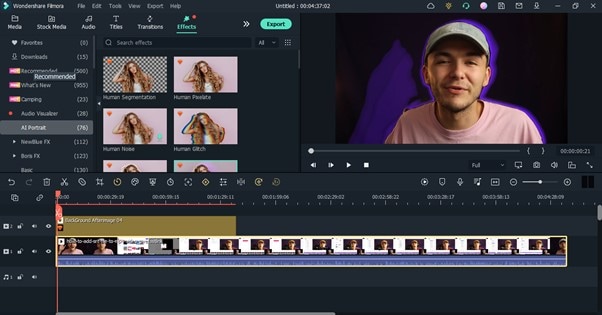
You can also change the AI Portrait effect settings. To do that, double-click on the effect from the timeline to prompt a pop-up window. Apply the AI Portrait effect from there.
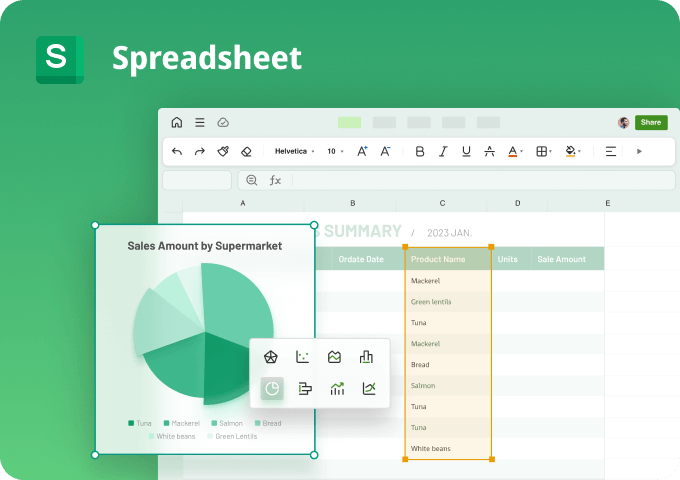
WPS Office Premium ( File Recovery, Photo Scanning, Convert PDF)–Yearly
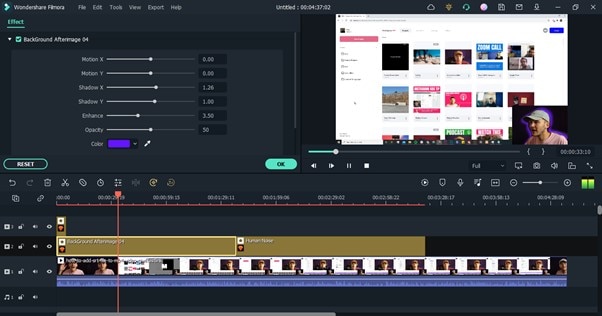
Step3 You can add royalty-free music to your YouTube video by clicking Audio from the top. Then, select the preferred audio to use in the video and move it to the timeline.
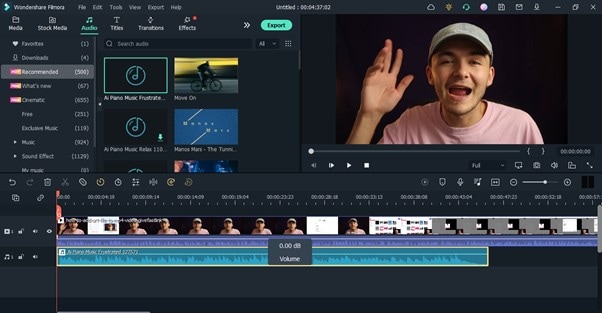
To adjust your audio settings, double-click the audio clip from the timeline and use the relevant button to balance audio fade-in and fade-out, volume, pitch, etc.
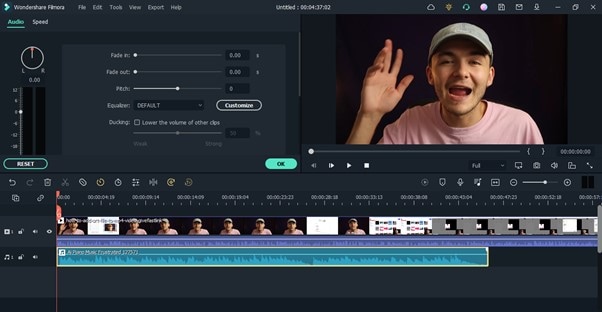
Step4 Another crucial thing you need to do is to add Subscribe watermark. To do this, click the >> icon next to Export from the top of the screen and select Element.

Locate and click ‘Social Media Show Element 07’ Effects. Drag-n-drop the selected effect to the Timeline.
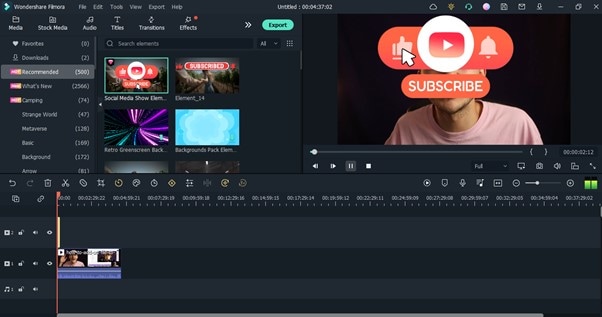
Step5 Change the position where the Subscribe watermark should appear in your video. Then, play the video to preview it.
Step6 After you’re done with the editing, click the Export button from the top bar and choose Burn DVD from the drop-down list that shows up.
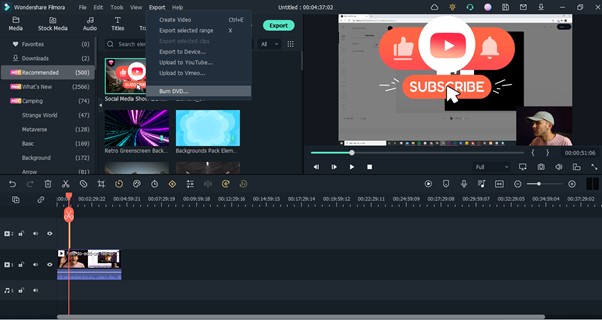
Spet 7: A pop-up window will appear on your PC screen. Select where you want to save the edited video file from the Folder Path section. Then, enter the file name in Lable. Click Export to finish.
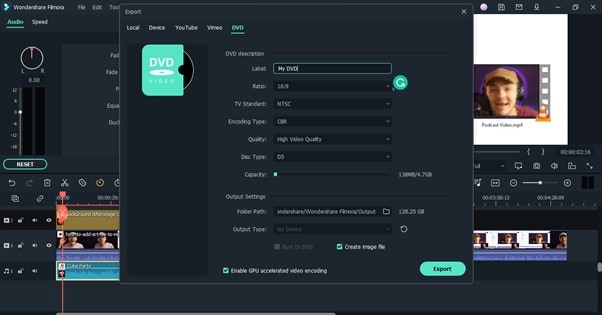
Final Words
That’s all on T-Series income on YouTube. T-Series did not just become successful overnight. It took consistent hard work. The team put so much effort not just to come up with ideas and create videos, but also to invest in the right tools to make their videos stand out in the industry. If you’re looking to start your YouTube journey and be like T-Series some days, you should start now. The first move you should make is to invest in Wondershare Filmora software, as it has lots of tools to offer for editing videos with high quality.
Free Download For Win 7 or later(64-bit)
Free Download For macOS 10.14 or later
Part 1: Information Box on T Series
Before we reveal all you need to know about T-Series YouTube income, here is an overview of Who T-Series is.
| Name | T-Series |
|---|---|
| Real Name | Bhushan Kumar Dua |
| Net Worth (2022) | $515.4 Million |
| Monthly Income and Salary | Approximately $8.6 Million |
| Yearly Income | Over $128 Million |
| Type | Private |
| Industry | Music & Entertainment |
| Founded | 11 July 1983; 39 years ago in Delhi, India |
| Founder | Gulshan Kumar |
| Key People | Bhushan Kumar Dua (Chairman, managing director), Krishan Kumar, Neeraj Kalyan (President) |
| Services | Music record label % Film production |
| YouTube Channel | T-Series |
| Awards and Recognition | Creator Awards |
Now you have an overview of what T-Series YouTube channel income is, read on to discover more
Part 2: T-Series YouTube Earning and Stats
T-Series main source of revenue is the views and adverts, and as of when this article was written, research shows that T-Series attracts more than 2.15 billion views per month. Since a YouTube channel could earn an average of $3 to $5 per one thousand views, it can be estimated that T-Series earn a monthly income of up to $8.6 Million per month, and could make up to over 128 Million per year. Do you still want to find out more? Check out the table on T-Series stats;
| Estimated Monthly Earning (USD/INDIAN RUPEES) | $8.6 Million / R.S699 Million |
|---|---|
| Estimated Yearly Earning (USD/INDIAN RUPEES) | Approximately $128 Million / R.S 10.4 Billion |
| Total Videos Uploads | 17, 516 |
| Total Views | 202,606,674,113 |
| Subscribers | 225 Million |
| Years Active | 16 years |
| Genre | Music |
T-Series is very popular on all social media platforms, including Facebook, Twitter, and Instagram. He has been in the game for so long that anyone believes in the content he creates. The company was discovered in the 1980s by Gulshan Kumar a cassette tape business, and it was focused on devotional music, especially Hindu hymns and Bollywood music.M

The good thing back then was that T-Series was the first of its kind, and the devotional music market was really big, especially amongst old folks. So, it was easy for T-Series music to reach the right audience within a short time, and it had its first breakthrough in the late 1980s.
Fast forward to 2004, telecommunication companies were having complaints from mobile phone users who were not satisfied with their ringtones. So, T-Series became their plug and started 30-second of their music to them. Then, in 2009, when YouTube was launched in India, T-Series discovered lots of his music where being uploaded on YouTube illegally. This led to a ruling against YouTube, and in January 2011, T-Series published its first video on YouTube.
Since 2011 till now, T-Series has experienced tremendous growth. T-Series has up to 29 different YouTube channels with total subscribers of 225million with over a billion views monthly, making them one of the top-leading YouTube channels globally. Right now,
Part 3: Why Is T-Series Trending on YouTube?
Since you already know what T-Series income on YouTube is, you might be eager to find out what he did that made him so popular and became a trend on YouTube. Well, the truth is, T-Series is not doing anything no one can do. However, he has been in the industry for so long that his YouTube channel is like a dish for many viewers, especially the ones in India.
Below are the three main things why T-Series is always trending on YouTube;

Huge YouTube Channel Monthly Visits
Boasting monthly views of over 100 million per month, T-Series is one of the few YouTube channels that usually have millions of visits from users globally every month. Research shows that the YouTube channel usually has approximately 7.9million visitors per month. This huge monthly visit helps them stay at the top of most YouTube searches that relates with his videos keywords, thus making them trend more when compared with his competitor’s YouTube channel.
Large Subscriber Base
With over 225 million subscribers and still counting, T-Series YouTube channel is a home for many folks to listen to music and see movie thrillers. The large subscriber base plays a huge role in his trend, and the subscriber base continues to increase, he still has the high chance of maintaining his trend within the industry for a very long time.
Regular Posting of Quality Videos
Having a huge YouTube subscriber base is one thing, but being able to deliver quality video content that anyone would love to watch is different. T-Series has been consistent in delivering quality videos, that immediately he uploads a new video on YouTube, he starts getting massive views instantly. Many folks are always eager to see his next upload on YouTube. This has been the same thing for T-Series over the past years, and it has helped him gained more and more popularity.
Bonus Tip: How to be a YouTuber and Make Videos like t series
To be a YouTube-like T-Series you don’t only need to put in the hard work in what you do, you also need to be smart and stay consistent. Plus, you must acquire advanced video editing software that will help you create videos that will make you stand out in the industry. One such video editing software is Wondershare’s Filmora video editor.
Filmora is a video editing powerhouse that boasts lots of efficient tools that one can use to edit every aspect of a video clip. From removing background noise to editing audio, adding transitions, applying effects, and lots more. The tool is one that any YouTuber must have at his/her fingertips.
Besides, Filmora offers lots of free built-in video effects from popular platforms like FilmStock, Pixel, Unsplash, and many others. The amazing thing is you don’t necessarily need video editing skills to utilize the features of the software.
Here is how to use Filmora to Create Impressive Videos for YouTube;
Free Download For Win 7 or later(64-bit)
Free Download For macOS 10.14 or later
Step1 Download the latest version of Filmora from the official website and install it. Then, launch the tool and use the Import button to upload the YouTube video you wish to edit.

Drag-n-drop the imported video to the Timeline.

Step2 Navigate to the top of the screen and select Effects. Choose AI Portrait from the left-hand side. After that, drag-n-drop a preferred AI Portrait effect to the Timeline. Then, adjust it to the section of your video you want it to be displayed.

You can also change the AI Portrait effect settings. To do that, double-click on the effect from the timeline to prompt a pop-up window. Apply the AI Portrait effect from there.

Step3 You can add royalty-free music to your YouTube video by clicking Audio from the top. Then, select the preferred audio to use in the video and move it to the timeline.

To adjust your audio settings, double-click the audio clip from the timeline and use the relevant button to balance audio fade-in and fade-out, volume, pitch, etc.

Step4 Another crucial thing you need to do is to add Subscribe watermark. To do this, click the >> icon next to Export from the top of the screen and select Element.

Locate and click ‘Social Media Show Element 07’ Effects. Drag-n-drop the selected effect to the Timeline.
Step5 Change the position where the Subscribe watermark should appear in your video. Then, play the video to preview it.
Step6 After you’re done with the editing, click the Export button from the top bar and choose Burn DVD from the drop-down list that shows up.

Spet 7: A pop-up window will appear on your PC screen. Select where you want to save the edited video file from the Folder Path section. Then, enter the file name in Lable. Click Export to finish.

Final Words
That’s all on T-Series income on YouTube. T-Series did not just become successful overnight. It took consistent hard work. The team put so much effort not just to come up with ideas and create videos, but also to invest in the right tools to make their videos stand out in the industry. If you’re looking to start your YouTube journey and be like T-Series some days, you should start now. The first move you should make is to invest in Wondershare Filmora software, as it has lots of tools to offer for editing videos with high quality.
Free Download For Win 7 or later(64-bit)
Free Download For macOS 10.14 or later
- Title: 2024 Approved A Compreenas Guide to Choosing Ideal Lenses for Filmmaking
- Author: Steven
- Created at : 2024-08-03 03:10:33
- Updated at : 2024-08-04 03:10:33
- Link: https://youtube-clips.techidaily.com/2024-approved-a-compreenas-guide-to-choosing-ideal-lenses-for-filmmaking/
- License: This work is licensed under CC BY-NC-SA 4.0.


 PCDJ Karaoki is the complete professional karaoke software designed for KJs and karaoke venues. Karaoki includes an advanced automatic singer rotation list with singer history, key control, news ticker, next singers screen, a song book exporter and printer, a jukebox background music player and many other features designed so you can host karaoke shows faster and easier!
PCDJ Karaoki is the complete professional karaoke software designed for KJs and karaoke venues. Karaoki includes an advanced automatic singer rotation list with singer history, key control, news ticker, next singers screen, a song book exporter and printer, a jukebox background music player and many other features designed so you can host karaoke shows faster and easier!

 CalendarBudget - Monthly subscription membership to CalendarBudget via web browser or mobile app. Support included.
CalendarBudget - Monthly subscription membership to CalendarBudget via web browser or mobile app. Support included.  WonderFox DVD Ripper Pro
WonderFox DVD Ripper Pro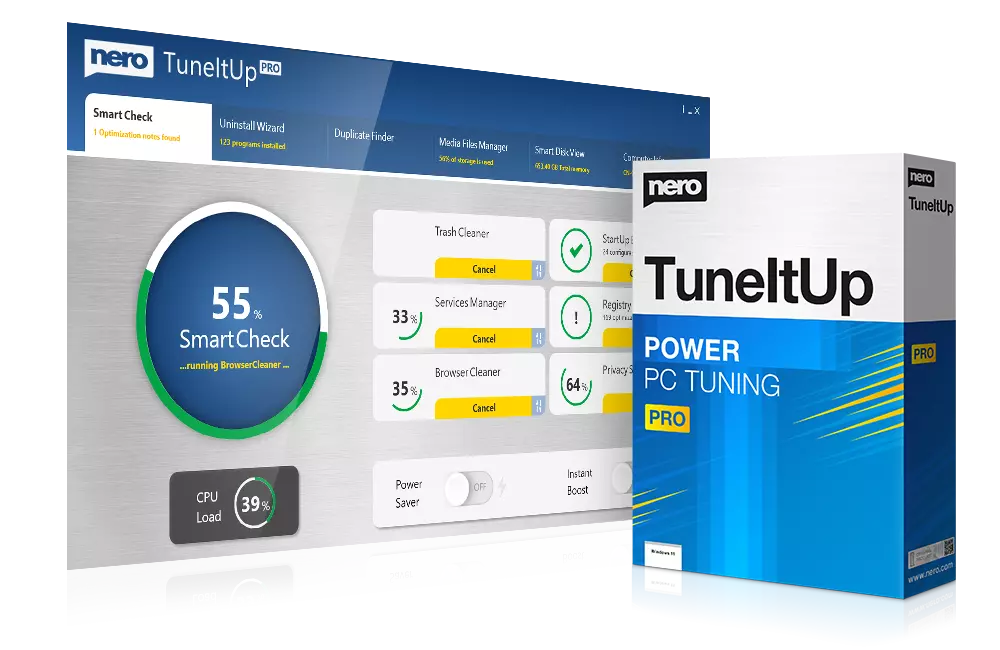 /a>
/a> Forex Robotron Basic Package
Forex Robotron Basic Package
 Jet Profiler for MySQL, Enterprise Version: Jet Profiler for MySQL is real-time query performance and diagnostics tool for the MySQL database server. Its detailed query information, graphical interface and ease of use makes this a great tool for finding performance bottlenecks in your MySQL databases.
Jet Profiler for MySQL, Enterprise Version: Jet Profiler for MySQL is real-time query performance and diagnostics tool for the MySQL database server. Its detailed query information, graphical interface and ease of use makes this a great tool for finding performance bottlenecks in your MySQL databases. 


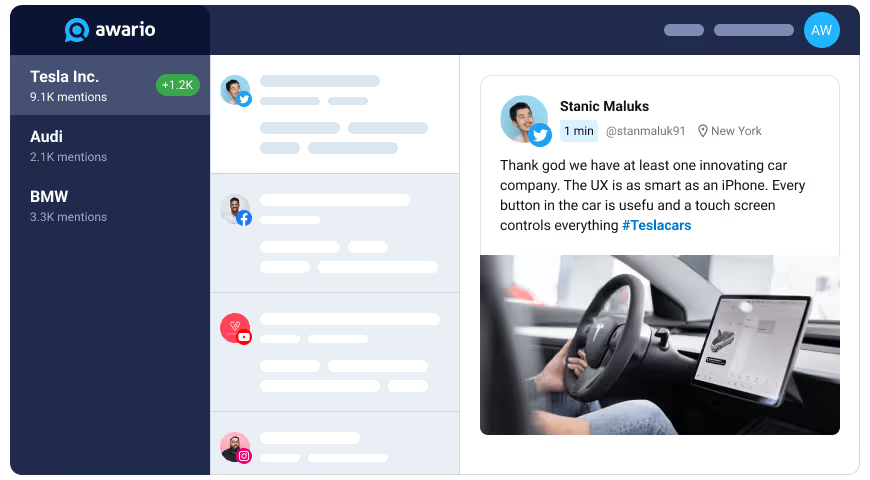
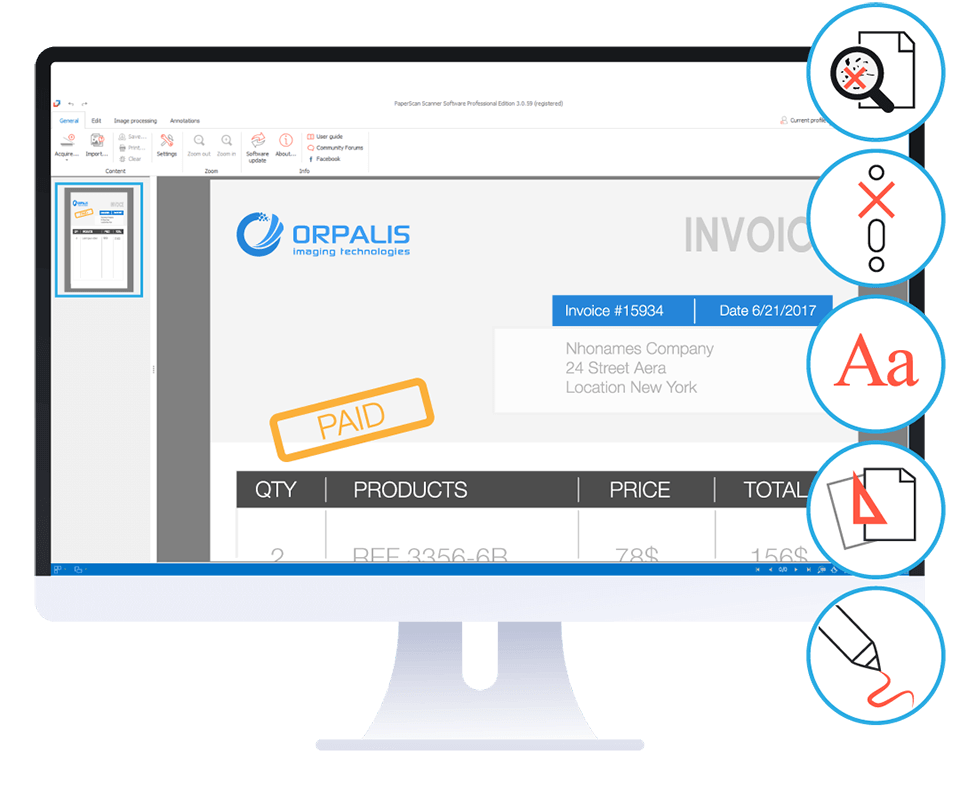 PaperScan Professional: PaperScan Scanner Software is a powerful TWAIN & WIA scanning application centered on one idea: making document acquisition an unparalleled easy task for anyone.
PaperScan Professional: PaperScan Scanner Software is a powerful TWAIN & WIA scanning application centered on one idea: making document acquisition an unparalleled easy task for anyone.